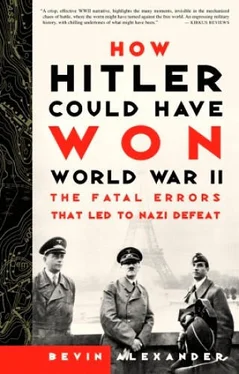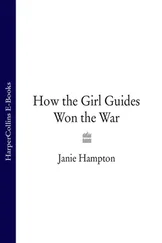Martin Blumenson wrote in his official history that one-third of the German combat effectives were killed or wounded, only a dozen tanks or tank destroyers remained in operation, and a parachute regiment attached to Panzer Lehr virtually vanished.
The difficulty of Collins’s advance after the bombing was due to spirited response of the Germans, a matter of habit, and to the caution and hesitation of the Americans, accustomed to the slow-moving battle of the hedgerows.
But German opposition melted away. By the end of July 26 American armor had penetrated ten miles, and the next day went farther. “This thing has busted wide open,” Leland Hobbs, commander of the 30th Infantry Division, exulted.
Collins enlarged the rupture, and kept moving south. On his right, Middleton’s 8th Corps broke through, and Middleton cut loose his armor. Once Middleton turned the corner at Avranches and headed into Brittany, George Patton’s 3rd Army was to be activated. Meanwhile Bradley asked Patton to supervise 8th Corps. A Patton trademark appeared almost at once: two armored divisions pushed forward through the infantry, emerged at the head, and dashed rapidly to Avranches, 35 miles away. Eisenhower’s judgment of Patton was being manifested: “an extraordinary and ruthless driving power at critical moments.” The Germans retreated or surrendered.
The bocage had been bypassed. The German left flank had collapsed. Montgomery announced the only German hope was a staged withdrawal to the Seine River, and to disrupt it the Allies should swing their right flank “round toward Paris.” This seemed to be turning into the kind of war that suited most Americans—wide open, hell-for-leather, with the horizon as the destination. George Patton, just the sort of general to lead such a campaign, was coming onto the scene. But Patton had to obey Omar Bradley, who was not at all a damn-the-torpedoes type. And no one was able to guess how Adolf Hitler would react.
On August 1, Patton’s 3rd Army was formally activated. Bradley moved up to command the 12th Army Group, and Courtney Hodges took over command of 1st Army. Altogether, the Americans had twenty-one divisions, five armored, sixteen infantry, nearly 400,000 men. Overwhelming power now faced the battered and outnumbered Germans.
Originally, Patton’s army had been intended to clear Brittany. But the Germans had stripped this region of most troops, and Bradley told Patton to send only Middleton’s 8th Corps to secure it. Middleton blazed through Brittany but failed to achieve the primary objectives—the major ports. The Germans withdrew into them. By the time the Americans had seized them, suffering huge losses, the need had long since passed.
Patton was by far the most inventive, venturesome, and action-oriented general on the Allied side. Shortly after he took command of 3rd Army, he recognized that a gigantic victory might be in the offing. The Americans were well south of Normandy, and the way was open for a massive strike east to the region or “gap” between Orléans and Paris, then to Paris, and from Paris down the right bank of the Seine to the sea, cutting off all German forces in Normandy.
But Patton had no authority to order such an offensive, and Montgomery, still in charge of land operations, believed the Germans would build a temporary new defensive line running generally south from Caen, through Mayenne, to Laval, possibly as far south as Angers, near the junction of the Loire and Mayenne rivers. He told Bradley to move up to this expected line on the south. On the north he ordered the Canadian 1st Army under Henry Crerar to strike south from Caen eighteen miles to Falaise on August 8, with the aim of cutting off the Germans,
Bradley directed Patton—who had only a two-division corps (the 15th) under Wade Haislip—to build a sixty-mile front along the Mayenne and take the towns of Mayenne, Laval, and Angers.
Patton instructed Haislip to seize Mayenne and Laval. And, since he still hoped to strike for the Orléans-Paris gap, told Haislip to be prepared to continue to Le Mans, a major town forty-five miles east of the Mayenne River. Haislip, whose policy was to “push all personnel to the limit of human endurance,” captured Mayenne and Laval on August 5–6, and Patton got Bradley’s permission to drive on to Le Mans.
Adolf Hitler saw the Cobra breakout to Avranches in an entirely different fashion than either Montgomery or the German generals on the spot. They, too, favored withdrawal from Normandy, and from France.
Hitler had been fixed on holding all positions since Stalingrad. But in Normandy there was the additional concern that—if the Germans withdrew—the motorized Allied armies could swiftly outrun the Germans’ horse-drawn transport. Also, where could the Germans retreat to? The Seine’s meandering course offered no sound defensive line. The best line was the German West Wall along the frontier. But it had been neglected since 1940 and would require six to ten weeks to repair. Hitler ordered work to start at once, reasoning that the Germans should remain in Normandy at least till the West Wall was defensible. Finally convinced the Allies would not invade the Pas de Calais, he ordered forces there to Normandy.
Also, Hitler saw the possibility of a riposte. The German western flank now rested just east of the town of Mortain, twenty miles from Avranches, in the wooded highlands of “Norman Switzerland.” On August 1, he ordered Kluge to strike from Mortain to recapture Avranches. This would anchor the German line on the Cotentin coast, and divide Patton’s 3rd Army south of Avranches from Hodges’s 1st Army north of it.
Kluge assembled four weak panzer divisions. Three were to roll through Mortain and the Americans defending it, and drive as far as possible. Once they lost their momentum, the fourth division was to go to the front and strike for Avranches.
Ultra intercepts of German messages informed Bradley of the intended attack shortly before it struck. He already had nearly five divisions in the area, and alerted them to the attack.
The blow hit Mortain in the early minutes of August 7. The U.S. 30th Division had occupied the town only hours before. Key to Mortain was Hill 317 just to the east. While German infantry struck at the hill, seventy panzers went around it, drove through the town, and headed west. By midday they had advanced six miles. But Allied aircraft forced the panzers into the woods. Fighting continued, but the Germans had no chance to break through the iron ring of defenses. Meanwhile the 700 Americans on Hill 317 stood their ground, helped by artillery concentrations and RAF Hurricanes and Typhoon fighter-bombers equipped with rockets.
Hitler charged Kluge with poor judgment, haste, and carelessness, and ordered the attack to continue with a larger force. Kluge was to transfer three panzer divisions from the British-Canadian front to thrust into the deep flank of the American advance (Patton’s move toward Le Mans).
Kluge, who saw the situation far more clearly than Hitler, knew his attack had bogged down, and the best move was to retreat. He also saw something that terrified him: the German front now extended as a deep salient into the Allied line. Montgomery’s two armies (British 2nd, Canadian 1st) and Hodges’s 1st Army were on the north, while Patton’s 3rd Army was sweeping toward Le Mans on the south. If it continued through the Orléans-Paris gap and beyond, it could encircle all German forces west of the Seine.
But Hitler’s orders were unequivocal, and Kluge directed the three panzer divisions to pull out of the British-Canadian sector and head for Mortain during the night of August 7. At 11 P.M., Kluge learned of an immense aerial bombardment along the road from Caen to Falaise— heralding a major attack by the Canadian army. One of the three panzer divisions had already left the Falaise sector, but Kluge canceled orders for the other two. The Germans could not afford to lose Falaise.
Читать дальше


![Джонатан Димблби - Barbarossa - How Hitler Lost the War [calibre]](/books/385421/dzhonatan-dimblbi-barbarossa-how-hitler-lost-the-w-thumb.webp)









